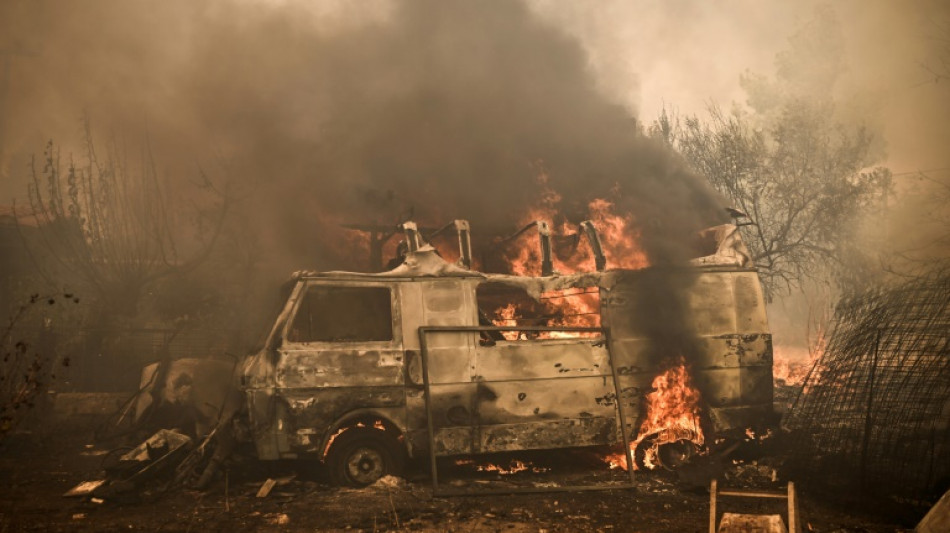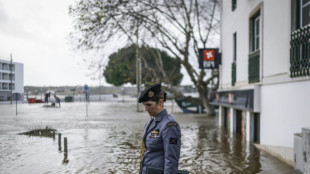
-
 German exports to US plunge as tariffs exact heavy cost
German exports to US plunge as tariffs exact heavy cost
-
Portugal heads for presidential vote, fretting over storms and far-right

-
 Suicide blast at Islamabad mosque kills at least 30, wounds over 130: police
Suicide blast at Islamabad mosque kills at least 30, wounds over 130: police
-
Russia says Kyiv behind Moscow shooting of army general

-
 Greenland villagers focus on 'normal life' amid stress of US threat
Greenland villagers focus on 'normal life' amid stress of US threat
-
Iran, US hold talks in Oman after Trump military threats

-
 Stocks waver as tech worries build
Stocks waver as tech worries build
-
Dupont, Jalibert click to give France extra spark in Six Nations bid

-
 'Excited' Scots out to prove they deserve T20 World Cup call-up
'Excited' Scots out to prove they deserve T20 World Cup call-up
-
EU tells TikTok to change 'addictive' design

-
 India captain admits 'there will be nerves' at home T20 World Cup
India captain admits 'there will be nerves' at home T20 World Cup
-
Stellantis takes massive hit for 'overestimation' of EV shift

-
 'Mona's Eyes': how an obscure French art historian swept the globe
'Mona's Eyes': how an obscure French art historian swept the globe
-
Iran, US hold talks in Oman

-
 Iran, US hold talks in Oman after deadly protest crackdown
Iran, US hold talks in Oman after deadly protest crackdown
-
In Finland's forests, soldiers re-learn how to lay anti-personnel mines

-
 Israeli president visits Australia after Bondi Beach attack
Israeli president visits Australia after Bondi Beach attack
-
In Dakar fishing village, surfing entices girls back to school

-
 Lakers rally to beat Sixers despite Doncic injury
Lakers rally to beat Sixers despite Doncic injury
-
Russian pensioners turn to soup kitchen as war economy stutters

-
 Japan taps Meta to help search for abuse of Olympic athletes
Japan taps Meta to help search for abuse of Olympic athletes
-
As Estonia schools phase out Russian, many families struggle

-
 Toyota names new CEO, hikes profit forecasts
Toyota names new CEO, hikes profit forecasts
-
Next in Putin's sights? Estonia town stuck between two worlds

-
 Family of US news anchor's missing mother renews plea to kidnappers
Family of US news anchor's missing mother renews plea to kidnappers
-
Spin woes, injury and poor form dog Australia for T20 World Cup

-
 Japan's Liberal Democratic Party: an election bulldozer
Japan's Liberal Democratic Party: an election bulldozer
-
Hazlewood out of T20 World Cup in fresh blow to Australia

-
 Japan scouring social media 24 hours a day for abuse of Olympic athletes
Japan scouring social media 24 hours a day for abuse of Olympic athletes
-
Bangladesh Islamist leader seeks power in post-uprising vote

-
 Rams' Stafford named NFL's Most Valuable Player
Rams' Stafford named NFL's Most Valuable Player
-
Japan to restart world's biggest nuclear plant

-
 Japan's Sanae Takaichi: Iron Lady 2.0 hopes for election boost
Japan's Sanae Takaichi: Iron Lady 2.0 hopes for election boost
-
Italy set for 2026 Winter Olympics opening ceremony

-
 Hong Kong to sentence media mogul Jimmy Lai on Monday
Hong Kong to sentence media mogul Jimmy Lai on Monday
-
Pressure on Townsend as Scots face Italy in Six Nations

-
 Taiwan's political standoff stalls $40 bn defence plan
Taiwan's political standoff stalls $40 bn defence plan
-
Inter eyeing chance to put pressure on title rivals Milan

-
 Arbeloa's Real Madrid seeking consistency over magic
Arbeloa's Real Madrid seeking consistency over magic
-
Dortmund dare to dream as Bayern's title march falters

-
 PSG brace for tough run as 'strange' Marseille come to town
PSG brace for tough run as 'strange' Marseille come to town
-
Japan PM wins Trump backing ahead of snap election

-
 AI tools fabricate Epstein images 'in seconds,' study says
AI tools fabricate Epstein images 'in seconds,' study says
-
Asian markets extend global retreat as tech worries build

-
 Sells like teen spirit? Cobain's 'Nevermind' guitar up for sale
Sells like teen spirit? Cobain's 'Nevermind' guitar up for sale
-
Thailand votes after three prime ministers in two years

-
 UK royal finances in spotlight after Andrew's downfall
UK royal finances in spotlight after Andrew's downfall
-
Diplomatic shift and elections see Armenia battle Russian disinformation

-
 Undercover probe finds Australian pubs short-pouring beer
Undercover probe finds Australian pubs short-pouring beer
-
Epstein fallout triggers resignations, probes


Climate change boosts risk of extreme wildfires 25%: study
Climate change has sharply boosted the risk of fast-spreading wildfires, according to a Californian study published Wednesday that offers lessons for prevention after recent disasters in Canada, Greece and Hawaii.
Scientists at the Breakthrough Institute, a non-profit research centre, found that human-caused warming increased the frequency of "extreme daily wildfire" by 25 percent on average compared to the pre-industrial era, in a study in the journal Nature.
Examining a series of blazes from 2003 to 2020, they used machine learning to analyse the link between higher average temperatures, dryer conditions and the fastest-spreading blazes -– ones that burn more than 10,000 acres (4,000 hectares) a day.
The impact of climate change varied from fire to fire.
In certain partly dry conditions, global warming pushed the area beyond key thresholds, making extreme fires much more likely. In very dry conditions, the impact was less.
"This means that we should pay the closest attention to the places and times that historically have experienced conditions just on the moist side of these thresholds, but which are being pushed over these thresholds onto the dry side by background warming," lead author Patrick Brown told AFP.
- Fierce wildfire season -
The researchers calculated that the risk could increase on average by 59 percent by the end of the century under a "low-emissions" scenario where global warming is limited to 1.8 degrees Celsius above preindustrial levels, and up to 172 percent in an unbridled high-emissions scenario.
Earth's surface has already warmed 1.2C.
Using data from recorded fires, the researchers measured the probability of a given blaze turning into an "extreme" one. Then they used computer models to calculate how far the post-industrial rise in temperatures had increased that risk.
The study controlled for variables such as precipitation, wind and absolute humidity and the researchers warned that changes in these could make the risk from global warming even worse.
California has suffered a string of extreme wildfires in recent years.
In 2020, more than 30 people died and four million acres were devoured by flames in some of the biggest fires in the state's history. The November 2018 "Camp Fire" killed 86 people.
The study's publication followed a summer of wildfires that killed at least 115 people in Hawaii and forced 200,000 from their homes in Canada.
Greece is battling what EU officials called the bloc's biggest wildfire on record along a 10-kilometre (six-mile) front. It has killed 20 people.
A 2022 United Nations Environment Programme report on wildfires said they are becoming more common due to hotter, dryer conditions caused by climate change, including in regions not traditionally prone to them.
- Fire prevention -
Nature study author Brown said the insights into dryness thresholds could aid prevention measures, for example by indicating the best spots for thinning and prescribed burning of vegetation to reduce the dry natural matter that wildfires feed on, known as "hazardous fuel".
"We are finding that under most conditions, the impact of hazardous fuel reductions can completely negate the impact of climate change," he said.
"It is plausible to have a future of much less wildfire danger despite climate change if we conduct these fuel treatments at scale."
He said the findings could also inform precautions regarding power lines and indicate where monitoring and awareness campaigns should be focussed, and firefighting resources deployed.
Other wildfire experts said awareness of fire risks will become increasingly important for authorities and even holidaymakers.
In a separate briefing by wildfire specialists on Wednesday not related to the study, Andrew Sullivan of Australia's national science agency CSIRO said expenditure was typically "skewed" towards responding to wildfires with not enough money allocated for preventing them.
He said there was a "global need to rebalance expenditure to improve risk mitigation" measures such as managing vegetation and fire-danger forecasting.
Q.Jaber--SF-PST




